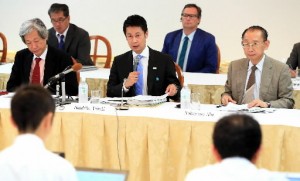Effort to bring about security that is not reliant on nuclear weapons Hiroshima Roundtable concludes Recommendations by researchers and others from five nations
Aug. 8, 2014
by Kenichiro Nozaki, Staff Writer
The Hiroshima Roundtable, a meeting on nuclear disarmament attended by former foreign ministers and researchers from five nations in the Asia-Pacific region, concluded on August 4 with the preparation of recommendations to governments around the world on achieving security that is not reliant on nuclear weapons. Japan, the United States and China were asked to take concrete actions.
The two-day meeting was sponsored by Hiroshima Prefecture. A total of 13 people participated including three former foreign ministers – Junko Kawaguchi of Japan, Gareth Evans of Australia and Han Sung-Joo of South Korea – as well as Chinese scholars who study U.S.-China relations. The meeting opened on August 3 at a hotel in Hiroshima’s Minami Ward. Discussions were closed to the public, but a press conference was held following the close of the meeting.
The group’s recommendations, which were written in English, filled eight pages. They pointed out the inhumanity of nuclear weapons and called on world leaders “to visit the cities of Hiroshima and Nagasaki to more fully understand the catastrophic consequences of any use of nuclear weapons” and stated that “a search for regional nuclear-free security requires attention to both confidence-building in the general sense and also confidence-building that concerns nuclear weapons in particular.”
The document referred to Japan, the U.S. and China as “key governments” in terms of security in East Asia. In a reference to its reliance on the U.S. “nuclear umbrella,” the group asked Japan “to recognize that continued support for nuclear protection in non-nuclear threat contingencies is inconsistent in principle with the serious commitment to eliminate nuclear weapons.” The group also called on the U.S., a nuclear superpower, to make further cuts in its arsenal and to ratify the Comprehensive Test Ban Treaty and recommended that China “affirm a policy of minimum effective nuclear retaliatory capability and continue its policy of restraint in not seeking parity with the U.S. and Russia.”
At the press conference, Hidehiko Yuzaki, governor of Hiroshima Prefecture, said, “We outlined how to take the first step toward the abolition of nuclear weapons.”
Kiichi Fujiwara, professor of international politics at the University of Tokyo, emphasized the meeting’s achievements, saying, “We were able to propose specific measures that China should take.”
The recommendations will be posted on the prefecture’s website in the near future, and the prefecture will consider how to convey them to the governments of countries around the world. The prefecture has said the Hiroshima Roundtable will continue to be held as part of its Hiroshima for Global Peace Plan, which outlines “the roles that Hiroshima should play in the nuclear weapons abolition process and worldwide reconstruction/peace-building efforts.”
(Originally published on August 5, 2014)
The Hiroshima Roundtable, a meeting on nuclear disarmament attended by former foreign ministers and researchers from five nations in the Asia-Pacific region, concluded on August 4 with the preparation of recommendations to governments around the world on achieving security that is not reliant on nuclear weapons. Japan, the United States and China were asked to take concrete actions.
The two-day meeting was sponsored by Hiroshima Prefecture. A total of 13 people participated including three former foreign ministers – Junko Kawaguchi of Japan, Gareth Evans of Australia and Han Sung-Joo of South Korea – as well as Chinese scholars who study U.S.-China relations. The meeting opened on August 3 at a hotel in Hiroshima’s Minami Ward. Discussions were closed to the public, but a press conference was held following the close of the meeting.
The group’s recommendations, which were written in English, filled eight pages. They pointed out the inhumanity of nuclear weapons and called on world leaders “to visit the cities of Hiroshima and Nagasaki to more fully understand the catastrophic consequences of any use of nuclear weapons” and stated that “a search for regional nuclear-free security requires attention to both confidence-building in the general sense and also confidence-building that concerns nuclear weapons in particular.”
The document referred to Japan, the U.S. and China as “key governments” in terms of security in East Asia. In a reference to its reliance on the U.S. “nuclear umbrella,” the group asked Japan “to recognize that continued support for nuclear protection in non-nuclear threat contingencies is inconsistent in principle with the serious commitment to eliminate nuclear weapons.” The group also called on the U.S., a nuclear superpower, to make further cuts in its arsenal and to ratify the Comprehensive Test Ban Treaty and recommended that China “affirm a policy of minimum effective nuclear retaliatory capability and continue its policy of restraint in not seeking parity with the U.S. and Russia.”
At the press conference, Hidehiko Yuzaki, governor of Hiroshima Prefecture, said, “We outlined how to take the first step toward the abolition of nuclear weapons.”
Kiichi Fujiwara, professor of international politics at the University of Tokyo, emphasized the meeting’s achievements, saying, “We were able to propose specific measures that China should take.”
The recommendations will be posted on the prefecture’s website in the near future, and the prefecture will consider how to convey them to the governments of countries around the world. The prefecture has said the Hiroshima Roundtable will continue to be held as part of its Hiroshima for Global Peace Plan, which outlines “the roles that Hiroshima should play in the nuclear weapons abolition process and worldwide reconstruction/peace-building efforts.”
(Originally published on August 5, 2014)








